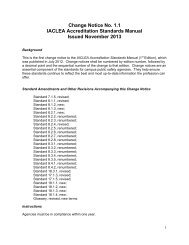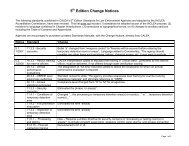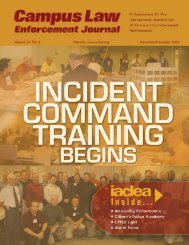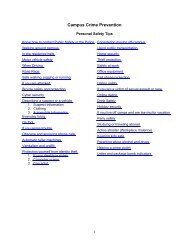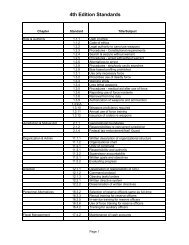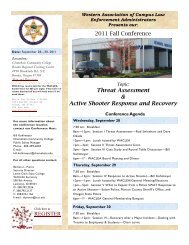IACLEA ACCREDITATION What is IACLEA Accreditation?
IACLEA ACCREDITATION What is IACLEA Accreditation?
IACLEA ACCREDITATION What is IACLEA Accreditation?
Create successful ePaper yourself
Turn your PDF publications into a flip-book with our unique Google optimized e-Paper software.
<strong>IACLEA</strong> <strong>ACCREDITATION</strong>Campus Public Safety Standards byCampus Public Safety ProfessionalsThe International Association of Campus Law Enforcement Admin<strong>is</strong>trators, Inc. (<strong>IACLEA</strong>) represents campuspublic safety leaders at more than 1,200 institutions of higher education. Since 2007, <strong>IACLEA</strong> has offeredaccreditation to colleges and university law enforcement, security, and public safety departments. As the leadingvoice for the campus public safety community, <strong>IACLEA</strong> <strong>Accreditation</strong> constitutes recognition that a departmentconforms to the highest professional standards for campus law enforcement and protective services.The process of accreditation makes “continuous improvement” a formal and systematic activity. The foundationof the <strong>IACLEA</strong> <strong>Accreditation</strong> Program <strong>is</strong> the set of standards developed by <strong>IACLEA</strong> members, representing bothsworn and non-sworn agencies. These standards, recognized as state-of-art professional public safetypractices, are the product of deliberate, innovative, and thoughtful consideration by experienced practitioners.The standards undergo constant review and rev<strong>is</strong>ion, ensuring that they are contemporary, relevant, andchallenging.<strong>Accreditation</strong> <strong>is</strong> a progressive and time-proven way ofhelping organizations evaluate and improve their overallperformance. The cornerstone of th<strong>is</strong> strategy lies inthe promulgation of standards containing a clearstatement of professional objectives.Participating admin<strong>is</strong>trators thenconduct a thorough self-assessmentto determine how ex<strong>is</strong>tingoperations can be adapted to meetthese objectives. When theprocedures are in place, a team ofindependent professionals verify thatall applicable standards have beensuccessfully implemented. Theprocess culminates with a dec<strong>is</strong>ionby an authoritative body that the agency <strong>is</strong> worthy ofaccreditation. <strong>IACLEA</strong> accreditation <strong>is</strong> unique in that itoffers campus public safety standards by campuspublic safety professionals.Generally, the <strong>IACLEA</strong> accreditation standards identify“what” an agency must do, not “how” to do it. Themajority of standards call for the development and<strong>What</strong> <strong>is</strong> <strong>IACLEA</strong> <strong>Accreditation</strong>?“<strong>IACLEA</strong> <strong>Accreditation</strong> <strong>is</strong> ablueprint for best practicesin campus public safety.”Anne P. Glavin,Chief of Police, California StateUniversity, Northridgeimplementation of written directives that articulate theagency’s policies, procedures, rules, and regulations.These directives serve as a proof of compliance to affirmthe agency’s commitment to the standards. Otherstandards may require an activity, areport, an inspection, or other action.Standards may or may not beapplicable based upon the functionsperformed by the agency. The agencymust consider its m<strong>is</strong>sion, its legallymandated responsibilities, and thedemands of its service to the communityin determining which standards areapplicable to the agency and how it willcomply with them. Standards areconsidered applicable if the function <strong>is</strong> an integralelement for improving the delivery of law enforcement,public safety or security services or professionalmanagement of an agency. Much of the value ofaccreditation <strong>is</strong> the self-assessment process, whenagencies must contemplate what functions they do, orshould, perform.<strong>IACLEA</strong> <strong>ACCREDITATION</strong>www.iaclea.org
<strong>IACLEA</strong> <strong>ACCREDITATION</strong>There are 5 steps to the <strong>IACLEA</strong> <strong>Accreditation</strong> process1. Inquiry and Application – Departments interested in theaccreditation program can initiate the process by a simpleinquiry to <strong>IACLEA</strong> Headquarters. They are alsoencouraged to thoroughly review the <strong>IACLEA</strong> <strong>Accreditation</strong>Standards Manual. A familiarity with the scope andcomplexity of the standards will enable the agency to makean informed and reasoned dec<strong>is</strong>ion about beginning theaccreditation process. The application form <strong>is</strong> available onthe Association website (www.iaclea.org). Upon subm<strong>is</strong>sionof the application and the $150 application fee, <strong>IACLEA</strong>staff forwards a package to the agency, which includes acontract, a Department ProfileQuestionnaire, and the <strong>IACLEA</strong><strong>Accreditation</strong> Process Manual, theguidebook for completing the process.2. Compliance Development andReview – The department now beginsa thorough examination of itsoperational practices and writtenpolicies. Written directives may haveto be prepared or modified. Systemsor procedures may have to beestabl<strong>is</strong>hed to meet standardsrequirements and ensure accreditationmaintenance. Proofs of compliance with applicablestandards must also be identified, copied and filed. Thedepartment will typically be required to meet ALL applicablestandards. The compliance documentation must bearranged in such a manner as to easily facilitate review byaccreditation assessors. When the department hascompleted compiling all necessary proofs and <strong>is</strong> sat<strong>is</strong>fiedthat it has met all of the <strong>IACLEA</strong> standards requirements, itcontacts <strong>IACLEA</strong> staff to arrange for an on-site assessment.3. Agency Evaluation – The <strong>IACLEA</strong> <strong>Accreditation</strong>Comm<strong>is</strong>sion will select a team of assessors to v<strong>is</strong>it theagency and review its suitability for accreditation. <strong>IACLEA</strong>will make all arrangements for travel and accommodations,without any expense to the agency. Assessors will beexperienced campus law enforcement professionals or“The accreditation standards area constant reminder of ‘communitypolicing’ and the serviceexpectations of a universityenvironment.”Elgin AustenDirector, Campus CommunityPolice Service, Western Universitytrained and certified assessors from related fields. Theevaluation will generally cons<strong>is</strong>t of a tour of facilities,interviews with agency personnel and members of thecampus community served by the agency, and a compliancereview of applicable standards. The assessors’ relationshipwith the candidate department <strong>is</strong> non-adversarial, providingon-site feedback to the department as the assessmentprogresses. The assessors will prepare a formal writtenreport and submit it to the agency and the <strong>IACLEA</strong><strong>Accreditation</strong> Comm<strong>is</strong>sion.4. Comm<strong>is</strong>sion Review – The finalreport will be d<strong>is</strong>tributed to the<strong>IACLEA</strong> <strong>Accreditation</strong> Comm<strong>is</strong>sionfor review. The Comm<strong>is</strong>sion, theprogram’s governing body, cons<strong>is</strong>ts oftwelve voluntary members. Nine are<strong>IACLEA</strong> members representing bothsworn and non-sworn agencies. Threeadditional members are drawn fromallied associations, including theNational Association of Collegeand University Business Officers(NACUBO); the National Associationof Student Personnel Admin<strong>is</strong>trators(NASPA); and the American Council on Education (ACE).When the <strong>IACLEA</strong> <strong>Accreditation</strong> Comm<strong>is</strong>sion <strong>is</strong> sat<strong>is</strong>fied thatthe department has met all compliance criteria they grantaccreditation to the department. <strong>Accreditation</strong> <strong>is</strong> for aperiod of four years.5. Award and Maintenance – When the <strong>IACLEA</strong><strong>Accreditation</strong> Comm<strong>is</strong>sion grants the agency accreditation,the agency <strong>is</strong> notified via letter and a Certificate of<strong>Accreditation</strong> <strong>is</strong> forwarded to them. They will also be invitedto attend the next <strong>IACLEA</strong> Annual Conference forrecognition during the Award Ceremony. To retain theaccredited status the department must maintain compliancewith all applicable standards. Prior to the end of the fouryearperiod, the department will be required to undergoanother evaluation to confirm continued compliance.<strong>IACLEA</strong> <strong>ACCREDITATION</strong>www.iaclea.org
<strong>IACLEA</strong> <strong>ACCREDITATION</strong>Reducing Legal Liability through <strong>IACLEA</strong> <strong>Accreditation</strong>Negligent security cases are an emerging area of civil law as crime victims increasingly attempt to hold the prem<strong>is</strong>e ownersand not the actual perpetrators civilly liable for crimes against them.Whenever a negligent security claim <strong>is</strong> brought against a university, that university and its campus public safety or securityagency must demonstrate that it has establ<strong>is</strong>hed and adheres to reasonable security standards. Achieving and maintainingaccreditation <strong>is</strong> one method by which campus security agencies can demonstrate compliance with professionally acceptedstandards of operation for law enforcement and security agencies. <strong>Accreditation</strong>, therefore, may make it more difficult tohold an institution liable for the criminal actions of a third party since the institution <strong>is</strong> able to demonstrate it acted withreasonable care in ensuring the security of its prem<strong>is</strong>es.Th<strong>is</strong> assertion <strong>is</strong> supported by several independent studies by state league-sponsored, self-insured pooling organizations.These surveys examined the differences in claims and judgments against accredited and non-accredited police departments.In each case, the researchers found that professional liability was prevented and losses were reduced among departmentsthat were accredited.“Participating in an accreditation process forces departments to ensure that they adhere to appropriate standards regardingtheir facilities, equipment, training and policies,” said Attorney Elliot B. Spector, Principal for the Connecticut Criminal LawFoundation, which provides training to law enforcement agencies. “In the last five years, the most common admin<strong>is</strong>trativecivil rights actions have been in the areas of failure to train, and inadequate or unconstitutional policies. A naturalprotection against such claims <strong>is</strong> the upgrading of training and policies, which should occur during the accreditationprocess,” said Spector, who has presented educational workshops on civil rights and police civil liability for the InternationalAssociation of Chiefs of Police annually since 1992.<strong>Accreditation</strong> can also help a department to defend against employment claims, including d<strong>is</strong>crimination, harassment, andretaliation – which are all active areas of litigation. By incorporating standards addressing compensation, conditions of work,d<strong>is</strong>ciplinary procedures, and other employment <strong>is</strong>sues, achieving accreditation helps ensure that campus security agencieshave adopted sound employment practices.There are three key elements in reducing professional liability. First, an agency should demonstrate compliance with a set ofprofessional standards that reflect the best practices within the profession. Second, compliance with those standards shouldbe thoroughly documented. Employees must be trained in the proscribed policies and procedures. Records of inspections,evaluations, investigations, and analys<strong>is</strong> must establ<strong>is</strong>h a cons<strong>is</strong>tent pattern of conformance to the standards. Written policiesalone are insufficient if it <strong>is</strong> customary to violate them. Third, credibility should be establ<strong>is</strong>hed through voluntary participationin self-assessment, an independent review by outsiders, and continuing documentation of compliance.“When your department has met all of the requirementsof the <strong>IACLEA</strong> <strong>Accreditation</strong> standards, it will earn you therespect of local law enforcement agencies. It <strong>is</strong> beneficialto the university to be able to state that it has anaccredited public safety department.”Regina Lawson, Chief of Police,Wake Forest UniversityFees & Additional InformationAn application fee of $150 initiates the accreditation process andprovides the agency with the <strong>IACLEA</strong> <strong>Accreditation</strong> Process Manual,the guide to the self-assessment process. The application fee will beapplied to the accreditation fee if the accreditation contract <strong>is</strong> signedwithin six (6) months of the application’s subm<strong>is</strong>sion.The annual fee for <strong>IACLEA</strong> accreditation <strong>is</strong> based on the institution’sfull-time equivalent (FTE) student enrollment. For schools with anenrollment of fewer than 10,000 students, the fee <strong>is</strong> $3,000 for thefirst year and $2,500 per year thereafter. Institutions, whoseenrollment <strong>is</strong> 10,000 or greater, pay an annual fee of $3,000. Theannual fee includes access to all required forms and materials, as wellas the on-site evaluation by a team of assessors.The <strong>IACLEA</strong> website (www.iaclea.org) <strong>is</strong> a particularly good resourcefor general information about the <strong>Accreditation</strong> Program. Simply clickon the “<strong>Accreditation</strong>” tab on the left side of the home page and it willgive you access to several links, including the following: “Standards”,which has a link to the <strong>IACLEA</strong> <strong>Accreditation</strong> Standards Manual thatcan be downloaded and printed; "Agencies in <strong>Accreditation</strong>", whichidentifies departments that have applied to the program, as well asthose that have achieved <strong>Accreditation</strong>; and "Frequently AskedQuestions", which provides general information about the benefits,fees and procedures of accreditation.Individuals, agencies or institutions, interested in <strong>IACLEA</strong> <strong>Accreditation</strong>,are encouraged to contact Jack Leonard, Director of <strong>Accreditation</strong> &LEMAP Services; (860) 586-7517 Ext. 558; jleonard@iaclea.org.<strong>IACLEA</strong> <strong>ACCREDITATION</strong>www.iaclea.org
International Association of CampusLaw Enforcement Admin<strong>is</strong>trators342 North Main StreetWest Hartford, CT 06117-2507Non-Profit Org.U.S. POSTAGEPAIDHartford, CTPermit No. 946Corporate Partners<strong>IACLEA</strong> <strong>ACCREDITATION</strong>Campus Public Safety Standards byCampus Public Safety ProfessionalsBenefits of <strong>IACLEA</strong> <strong>Accreditation</strong>• Provides a professional benchmark for measuring policies and practices• Assures the university admin<strong>is</strong>tration, the community served, local law enforcement and institutional peersof a high quality of service• Ensures procedures are documented and staff <strong>is</strong> given clear guidance• Enhances the recruitment and retention of qualified staff• Ensures that staff <strong>is</strong> trained and functions according to establ<strong>is</strong>hed policy and procedure• Strengthens an institution’s defense against complaints and lawsuits• Boosts institutional pride and employee morale• Provides periodic, professional review of department operations, admin<strong>is</strong>tration, and services



